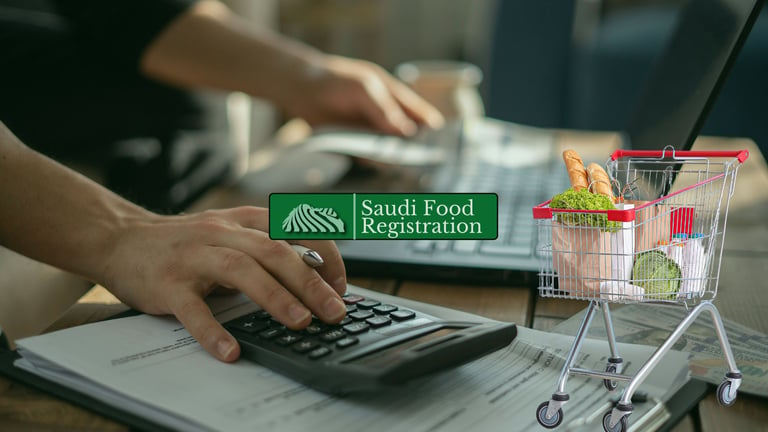Register Your Food Products in KSA – Cost & Timeline 2025
Discover how to register food products in Saudi Arabia. Learn 2025 SFDA costs, approval steps, halal testing & how to avoid delays with expert support.
1/29/20253 min read


How Much Does It Cost & How Long Does It Take to Register a Food Product in KSA?
Navigating the Saudi Food and Drug Authority (SFDA) food registration process can be complex and costly for businesses seeking to enter the Saudi Arabian market.
This comprehensive guide will break down everything you need to know about the registration process, associated costs, and strategies to streamline your food product approval.
Understanding SFDA's Food Registration Process
Food product registration in Saudi Arabia is not just a bureaucratic formality—it's a critical step to ensure consumer safety and product compliance.
The Saudi Food and Drug Authority (SFDA) mandates rigorous registration for all food products entering the Saudi market, making it essential for businesses to understand the intricacies of this process.
Why SFDA Registration is Mandatory
The SFDA registration process serves several crucial purposes:
Protecting consumer health by ensuring food safety standards
Verifying product ingredients and nutritional information
Confirming compliance with Saudi Arabian food regulations
Preventing potentially harmful or non-compliant products from entering the market
Key Regulatory Steps
The food registration process typically involves:
Document preparation and translation
Comprehensive product testing
Submission of technical files
Laboratory analysis
Halal certification (if applicable)
Final review and approval by SFDA
SFDA Food Registration Costs Breakdown
Understanding the financial investment required for food product registration is crucial for businesses.
Costs can vary depending on product type, risk level, and additional compliance requirements.
1. Application & Registration Fees
These fees depend on the type of product, its risk classification, and whether it requires additional assessments.
Standard government filing fees typically range from 1,000 to 5,000 SAR. Higher-risk or novel food products may incur additional fees due to extra scrutiny.
2. Laboratory Testing Costs
Testing costs fluctuate based on the complexity of the product and the number of required tests.
Basic food products (e.g., bottled water, dry goods) may require standard microbiological and chemical testing, costing 3,000 to 5,000 SAR.
Complex formulations (e.g., infant formula, fortified foods) demand extensive safety analysis, pushing costs to 7,000 to 10,000 SAR.
3. Halal Certification Fees
Halal certification is mandatory for many food products and costs depend on product category and certification body.
Processed foods with minimal animal-derived ingredients may cost 2,000 to 4,000 SAR.
Meat and dairy products require stringent inspections, with fees ranging between 5,000 to 7,000 SAR.
4. Translation & Documentation Costs
All registration documents must be translated into Arabic by certified professionals.
Basic documentation (e.g., ingredient lists, product labels) may cost 1,500 to 3,000 SAR.
Technical documents (e.g., scientific studies, complex formulations) may range from 3,000 to 5,000 SAR.
5. Optional Consultancy Fees
Hiring regulatory consultants helps businesses navigate SFDA requirements efficiently.
Small businesses or startups may spend 5,000 to 8,000 SAR, while larger companies dealing with multiple products may invest 10,000 to 15,000 SAR.
Timeline for Food Product Registration in Saudi Arabia
Standard Registration Duration
The average food registration process takes 3-6 months, depending on product complexity and document completeness.
Novel Food & High-Risk Products
Products classified as novel or high-risk (e.g., functional foods, biotech ingredients) require additional evaluation and testing.
The process can extend to 6-12 months, especially if the product lacks prior regulatory approvals.
Factors That Delay Registration
Incomplete documentation – Missing or incorrectly translated documents can cause rejections.
Insufficient product testing – If SFDA requires additional safety validation, the timeline increases.
Non-compliance with SFDA guidelines – Non-adherence to specific food safety standards leads to delays.
Unclear or inadequate translations – Poor translations may result in misinterpretations and resubmissions.
Ways to Reduce Costs & Speed Up Approval
Proactive Strategies
Pre-check Compliance – Conduct thorough internal reviews before submission to prevent costly mistakes.
Work with SFDA-Approved Labs – Using recognized laboratories minimizes the risk of test result disputes.
Prepare Complete Documentation – Submitting fully compliant documents prevents back-and-forth revisions.
Engage Regulatory Consultants – Professionals can streamline complex registrations and fast-track approvals.
How Saudi Food Registration Can Help
Our specialized services offer:
Cost-effective registration solutions
Expert guidance on reducing fees
Comprehensive support for SFDA, Halal, and compliance requirements
Streamlined approach to minimize processing time
Related Reads
GCC Food Registration Made Easy – A step-by-step guide on regulatory approvals across the GCC.
Navigating Novel Food Approvals in Saudi Arabia – Key requirements for bringing innovative food products to market.
Avoid Costly Mistakes in 2025 – Strategies to prevent regulatory setbacks in SFDA food registration.
Learn how ISO 22000 certification ensures food safety compliance and market expansion in Saudi Arabia.
At The End:
Registering a food product in Saudi Arabia requires careful planning, substantial investment, and meticulous attention to detail.
By understanding the process, anticipating costs, and implementing strategic approaches, businesses can successfully navigate SFDA requirements and enter the Saudi market effectively.
Final Tips
Start the process early to accommodate any regulatory changes.
Budget for comprehensive testing and possible retesting.
Seek professional guidance for compliance accuracy.
Stay updated on SFDA regulatory changes to avoid unexpected hurdles.
Disclaimer: Costs and timelines are approximate and can vary.
Always consult with SFDA-approved professionals for the most current information.
